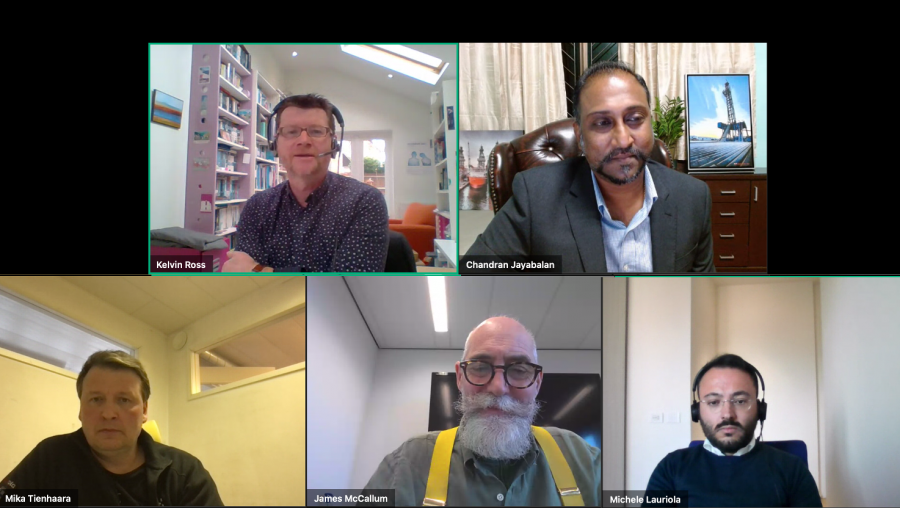This week I joined Kelvin Ross from Enlit Europe’s Power Engineering International as a speaker and panelist to discuss the topic, ‘Green is the New Black’, along with fellow panelists Chandran Jayabalan from Aggreko, Mika Tienhaara from ROCSOLE, and Michele Lauriola, from Baker Hughes.
Those who know me will know that I’m not one to shy away from a debate, and the future of the energy industry, digitalisation, big data, and technological innovations is a topic I’m more than just interested in.
I’m an engineer by trade (and by heart) – I’m ceaselessly looking at the world and asking, “why are we doing it like that, is there is a better way?” (which gives you some idea of how Proteus was born). It also means that I like to constantly question myself, and those around me.
So here are the five questions I asked myself and the audience during the session. This is not a conversation that is likely to come to an end any time soon, so if you want to carry on the conversation, drop me a message, and I’d love to chat.
1) Is “green is the new black” already yesterday’s news?
If we look at this week in the media, a week when we are rapidly approaching $100 oil – we’ve seen some interesting stories hit the headlines:
- The European Union Commission categorically defines gas as a ‘transition fuel source’
- Major banks, including Barclays, HSBC, and BNP Paribas, admit to having funded some of the big oil and gas companies over the last quarter – which would seem to fly in the face of the commitments made by the finance sector, just very recently, in Scotland at COP26
- Major Oil and Gas Operators report record profits
So, do I think green is the new black is already yesterday’s news? In a word, no. Personally, I am a firm advocate that green is absolutely the new black. We are in the beginnings of probably the most exciting phase for the energy industry since the 1970s, and the pathway to energy transition and a low carbon energy world is going to get really, really exciting over the next decade. But, it does come off the back of a decade of recession for the upstream oil and gas sector with very little investment in producing assets, which is now having a material impact on global energy security. This has left us facing record prices for oil and gas at a time when renewable energy is simply not able to meet the post-Covid demand for power. There is finally growing recognition that there has to be a well-coordinated and invested period of transition if we want to avoid a protracted period of high energy prices that could push many consumers into energy poverty.
We are in the beginnings of probably the most exciting phase for the energy industry since the 1970s
2) Is it already decided who will lead to this transition going forward?
Indeed, if you looked at the recent Scotwind Offshore Licencing round, the largest renewable offshore licensing awards to date, you might begin to think so. Nearly half the licences were awarded to major upstream oil and gas companies or partnerships involving traditional hydrocarbon producers. Major utility providers dominated the other half.
Perhaps this might make you think who will lead the transition has already been decided, but I don’t believe this is the case. We are coming to the end of a decade of turmoil in our industry, and we have an energy supply chain that is at best broken from a decade of under investment, write-offs and bankruptcies. In fact, many of the large supply chain companies are trading at a fraction of their value. The OSX index, an aggregated index of the major energy service providers, is down from above 200 to just over 60 in less than a decade, giving you a good indication of just how many of the major service companies have been heavily affected by this last decade of recession and under investment.
As a result, the landscape is wide open with opportunity – and it’s going to be about who responds quickest and most effectively to the very different business performance metrics of the coming energy decade. A decade that will be led by only the most entrepreneurial of businesses that will digitally transform to become highly efficient in utilising their assets – hardware, software and talent. This is in addition to operating successfully and sustainably at the significantly reduced margins of the diversified energy sector.
the landscape is wide open with opportunity
3) As we move into the digital space, what happens to the existing big companies when knowledge is no longer a proprietary asset?
Look at what has been happening to our industry. From the million jobs lost from oil and energy in the last 10 years, to the events of the last two years as a result of the pandemic, where the shift to remote working, as well as the exponential growth in freelancer talent, has changed the way we work and will continue to work, for good. What does it mean for our industry when we can work remotely with an expert on the other side of the world? An expert who can bring the capabilities you desperately need to your project but doesn’t want to be a staff employee. It’s now become a pure question of how companies manage the supply and demand of knowledge. This ‘knowledge transition’ will to continue to be both a challenge and opportunity for organisations as offices become decentralised and the workforce becomes more hybrid. Equally, it presents a wonderful opportunity for individuals to use their expertise where and how they want – increasingly across multiple projects and companies, often concurrently.
At Proteus, we are focused on solving these challenges and disrupting the traditional ERP and knowledge acquisition sectors, or as we prefer to call it, the work management solutions sector. “Work. Simplified.” is our mantra – we believe that project success means business success. If your projects aren’t performing efficiently, what does that say about your organisation? So, the big question is how will companies stand out when trying to differentiate themselves from everybody else in this new evolved ‘energy and knowledge transition’ space?
What does it mean for our industry when we can work remotely with an expert on the other side of the world?
4) How will companies attract capital to get them a ticket to the low carbon party?
Attracting capital and investment is going to be about four key things:
- Efficient utilisation of your hardware and software assets
- Optimising your margins in an industry driving tighter margins
- Accessing the global talent pool (and managing a hybrid workforce effectively)
- Minimising your carbon footprint, including that of your supply chain
There is no doubt that access to capital is becoming increasingly constrained and that this trend will continue. Companies need to take control of their journey towards a world of Climate Change Disclosure (TCFD) and ESG reporting using digital transformation to drive improved business performance. Leading companies will also seek transparency on how their supply chain is actually performing, from people to hardware to carbon using work management solutions.
Digital transformation and data transparency will enable new players and leading businesses to demonstrate both their business and environmental credentials. This will make them attractive to responsible capital providers and enable them to continue growing, investing and diversifying.
Acquisitions and mergers are something that is undoubtedly going to define the coming five years, whether you’re a big company or a small company. To survive and thrive in this corporate jungle, access to capital will be essential for business success in an increasingly constrained lending environment.
Leading companies will also seek transparency on how their supply chain is actually performing
5) How will companies get ahead in this world of energy transition and digital transformation?
I come from a background of building successful technical knowledge management consultancies. I was the co-founder of GMIS / ADTI, then Senergy Group. My Xergy co-founder Colin Manson was the co-founder of Xodus Group – two of the upstream industry’s most successful technical management consultancies. In coming together to develop a work management solution, which evolved from our experience in developing the systems that were the backbone of our previous ventures, we can help companies in the energy industry manage their processes and projects better. Very few can afford the large-scale ERP software solutions available in our industry, solutions that have only been economically accessible by the major players.
Until now.
To lead the energy transition, companies in our industry need to manage business much more effectively, and certainly more efficiently than the heady days of black, double-digit margins. If we want to play our part in the green transition, we will have to optimise our processes and the utilisation of our people. Many of those will be freelancers – we’re going to have to connect to them wherever they are in the world and manage them into the product delivery process very, very efficiently.
At Xergy, our platform Proteus focuses on the ‘process space’, and how that connects with the ‘people space’. Proteus is a work management solution that disrupts the existing ERP model – we have created something which works for our industry and its budgets. It enables a business to manage every aspect of the project delivery process it is involved in, catalysing business success by giving management and project teams access to a digital transformation solution that isn’t cost-prohibitive and is easy to use.
If we want to play our part in the green transition, we will have to optimise our processes and the utilisation of our people
Personally, I, like others, hope to see silver bullet technologies emerge in the hydrogen, storage renewables and low carbon space. The first step of digital transformation is available and accessible to all of us right now – simply by getting our organisations to perform better by embracing the digital tools that allow us to do that. Proteus sits as a single point of truth solution in starting this transformation journey.
So, as I said, I believe green is indeed the new black, but only if you have the right digital toolkit to enable you to play.
Work. Simplified.
About Proteus
Proteus developed by a Scottish-based tech company, Xergy Group, is an end-to-end project management solution developed for the energy and engineering consulting industries.
Proteus is industry-proven and enables consultancies to meet project demands across the full lifecycle, from proposal development to project delivery. With robust sales and project delivery modules, Proteus helps its customers win more business, increase efficiencies, manage expenditures, and improve project controls.
Critical workflows, automation, and controls are integrated into Proteus. These include opportunity evaluation, proposal building, resource planning, budget tracking and forecasting, real-time multi-level restricted dashboards, and project performance analytics.
Third-party integrations and customised solutions allow Proteus’ users, which include C-suite, project leads, and engineers, to get the exact software solution needed for their business.
We offer a free onboarding consultation service to ensure your company account is set up to your company’s needs.
How to get Proteus
Proteus operates under a software-as-a-service (SaaS) model. We offer Enterprise packages and flexible pricing solutions: contact our team to learn more.
We designed Proteus to be simple, and that means you can get up and running on Proteus without an IT team or support from a programmer. You will want to spend a bit of time configuring the admin console so that you have everything set up to suit your company structure, but it’s very intuitive and you don’t need a PhD in IT.
However, we want you to get the best out of what is a brilliantly powerful tool, so don’t hesitate to ask for our support. We have a team of product experts who are ready to help you with the configuration process, so get in touch today by filling out the form below:



